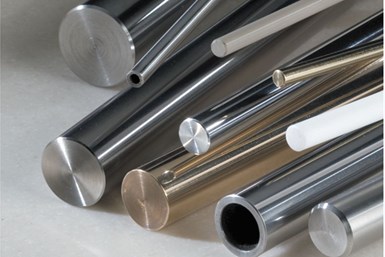Supply Chain Management Can Work for You
A VMI program can reduce cost and also increase speed to market by eliminating the additional time needed to move material from vendor to vendor.

OEMs looking to streamline operations while reducing overall product costs can partner with a supplier that has the capability to manage the process. Beginning with material selection through to delivery on an agreed upon schedule, a vendor managed inventory (VMI) program can result in savings, both in dollars and time, all without sacrificing quality.
Boston Centerless (BC) works with customers to design supply chain management programs that support their production needs. VMI programs can produce cost reductions and increased efficiency. For example, manufacturers might purchase raw material from one vendor, then ship it to a different vendor for a secondary operation or inventory a large quantity of material in-house until needed for production. This ties up resources managing multiple vendors, increases shipping costs (as well potential for damage or delays in transit) and ties up working capital. A VMI program can reduce cost and increase speed to market by eliminating the additional time needed to move material from vendor to vendor.
With a VMI, the customer benefits from reduced inventory cost; shorter lead times; shipments that meet just-in-time demand; reduced excess inventory and inventory shortages; and less administrative work. Inventory management program types to consider include: blanket orders, Kanban, JIT, hold-for-release, dock to stock, consignment and dock to line.
As an example, a fluid control manufacturer was having difficulty receiving and unloading large shipments of bar material. The oversized bars were heavy, and the customer did not have an overhead crane at its facility, which meant deliveries had to be made using a flatbed truck. It was also experiencing a large spike in material usage and, as a result, was having difficulty procuring material fast enough to keep up with customer demands. The usage got to a point where the manufacturer could no longer accurately forecast when it would need BC to deliver the material and could only tell us at a moment’s notice when it needed more.
The solution? BC arranged a Kanban program to hold finished goods inventory in a distribution center (DC). We then contracted with a local flatbed company to work on an on-call basis to make same-day deliveries from our DC to the customer. To solve the issue with the spike in material demand, BC installed a short-term solution to get the customer back on track and long-term solutions to keep material flowing optimally for the future.
To start, BC contacted suppliers and procured as much material as possible. After grinding the material, BC held it in a finished goods inventory. We contracted with an LTL carrier that would pick up and deliver the product within miles of the customer where it would be transferred to a flatbed delivery truck for “final mile” customer delivery.
For the long term, BC pre-produces a quantity equal to multiple months of the customer’s annual usage for that part. BC holds the multiple releases in the DC, guaranteeing 24-hour delivery from the request time. To manage the future flow of product, a BC field sales manager meets with the customer’s planners to review raw material and finished good inventory levels versus current and future demand for the product. This enables BC to make adjustments, where required, and ensure that supply and demand are in sync, thereby preventing stockouts and excess inventory situations.
Customer benefits include transportation costs reduced by 75%; procurement of a larger volume of material generated cost savings; and finished product is available locally with same-day delivery via a flatbed truck. BC manages logistics and ensures that receiving material deliveries is not an issue at the customer facility, saving the customer both time and headaches in managing the process.
About the Author
Steven Tamasi
Steven Tamasi is owner and CEO of Boston Centerless, manufacturer and distributor of precision bar materials.
Read Next
How EPA Decisions Might Affect Surface Preparation
Last year, the EPA determined that four degreasing solvents used in parts cleaning pose “unreasonable risks” to workers. By the end of 2022, there should be new rules outlining restrictions on how the solvents can be used. Solvent bans are possible. What should surface finishing companies do?
Read MoreThe U.S. Industrial Base and National Security
In terms of manufacturing, will the United States look back at the present time and recognize a pivot between greater private/public collaboration and a greater emphasis on national security?
Read MoreWastes That Detract From Quality
Quality is the absence of waste. So what are some wastes that detract from Quality?
Read More


















